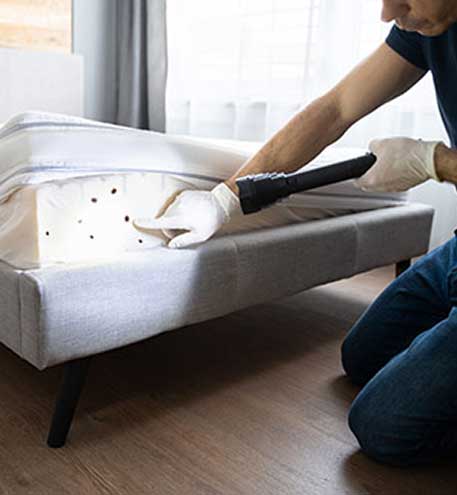Best Kings Bug Control Cincinnati: Premier Exterminators
Best Kings Bug Control Cincinnati: Premier Exterminators
Blog Article
A Malfunction of the Numerous Sorts Of Bug Control Solutions
In the world of insect control, a multitude of techniques exist to battle the visibility and address of unwanted creatures. As we navigate via the diverse landscape of bug control services, recognizing the ins and outs of each approach comes to be extremely important in establishing the most effective course of activity.
Chemical Pesticides
Chemical pesticides are generally made use of in insect control to properly get rid of a large range of bugs and other insects. These pesticides function by targeting the anxious system of the bugs, interrupting their normal features, and inevitably leading to their death. The use of chemical pesticides has actually been a staple in the parasite control market for decades due to their effectiveness and quick results.

Nevertheless, it is vital to utilize chemical pesticides with care because of their potential hazardous impacts on the atmosphere and non-target species. Inappropriate application or overuse of these pesticides can lead to air pollution, damage to valuable insects, and resistance advancement in bug populations. Therefore, it is essential to comply with safety guidelines and guidelines when using chemical pesticides for parasite control.
Biological Control Approaches
Considering the possible environmental influences and dangers connected with chemical pesticides, organic control approaches provide an even more lasting approach to managing insect populaces. Biological control involves using natural adversaries, such as microorganisms, bloodsuckers, and predators, to reduce pest populations. This approach is usually extra targeted, affecting just the specific pest types while lessening damage to advantageous insects, human beings, and the environment.

One advantage of biological control is its lasting efficiency. As soon as developed, all-natural opponents can help regulate pest populations continually without the demand for duplicated applications of pesticides. Furthermore, biological control is commonly much more cost-effective and can aid minimize pesticide resistance in insect populaces gradually. On the whole, biological control techniques provide a ecologically pleasant and sustainable remedy to pest administration.

Mechanical Insect Control
Mechanical parasite control involves the physical control or elimination of insects to handle their populations successfully. One common example of mechanical bug control is using traps to catch insects or rodents.
An additional mechanical strategy is using barriers such as fencings, screens, or internet to block insects from getting in specific locations. By literally avoiding insects from accessing a place, the probability of invasions or damage can be significantly lowered. Additionally, hand-operated approaches like handpicking bugs off plants or structures can be effective for smaller-scale infestations.
While mechanical pest control approaches can be labor-intensive, they use a non-chemical alternative that can be sustainable and environmentally pleasant. By targeting insects straight, mechanical control methods can help maintain insect populations in check without counting on pesticides.
All-natural Treatments
Utilizing all-natural treatments for pest control supplies a lasting and environment-friendly technique to managing bug populations without resorting to chemical treatments. Natural treatments involve making use of substances stemmed from plants, minerals, or other naturally occurring sources to hinder or remove parasites. For example, growing certain herbs like basil, mint, or lavender around your residential or commercial property can drive away insects because of their strong fragrances. Diatomaceous earth, a powder made from fossilized algae, can be used to combat pests like ants, cockroaches, and bed pests by dehydrating their exoskeletons.
In addition, necessary oils such as tea tree oil or neem oil have insecticidal properties that can efficiently manage pests while being risk-free for the environment. One more all-natural remedy is presenting advantageous pests like ladybugs or praying mantises to your garden to exploit hazardous pests. By integrating these all-natural remedies into bug monitoring techniques, mosquito pest control people can lower their dependence termite and pest control on artificial chemicals and promote a healthier, a lot more well balanced ecological community.
Integrated Pest Administration
Integrated Bug Administration (IPM) is a detailed strategy that incorporates numerous approaches to efficiently regulate pest populaces while decreasing threats to human health and wellness and the atmosphere. IPM involves the integration of multiple parasite control approaches such as biological control, habitat manipulation, alteration of social methods, and the use of resistant plant ranges. By utilizing a mix of these methods, IPM aims to reduce dependence on chemical pesticides, which can have unfavorable effect on ecosystems and human wellness.
One secret aspect of IPM is the emphasis on avoidance. By carrying out measures to stop bug infestations prior to they take place, such as preserving correct cleanliness and securing entry points, the demand for reactive bug control actions is reduced. Surveillance and regular assessments play an important duty in IPM, permitting early detection of bug concerns and punctual intervention.
Final Thought
In verdict, the various kinds of bug control solutions provide a series of options for efficiently handling parasite problems. Chemical chemicals give quick check my site elimination yet might have ecological threats. Biological control methods make use of natural killers to manage insects. Mechanical insect control involves physical obstacles or traps. Natural solutions provide safe alternatives. Integrated Parasite Administration incorporates several approaches for an all natural technique to pest control. Each technique has its very own benefits and downsides, and picking the most suitable solution depends upon the particular bug problem handy.
Chemical pesticides are generally utilized in parasite control to properly eliminate a wide array of pests and various other parasites.Mechanical bug control includes the physical control or removal of bugs to manage their populations successfully (Kings cincinnati pest control companies).Making use of natural solutions for pest control supplies a lasting and green strategy to handling insect populaces without resorting to chemical interventions.Integrated Parasite Monitoring (IPM) is a thorough strategy that incorporates various techniques to efficiently control pest populaces while minimizing dangers to human health and the setting.In conclusion, the different types of insect control solutions provide an array of alternatives for efficiently handling insect infestations
Report this page